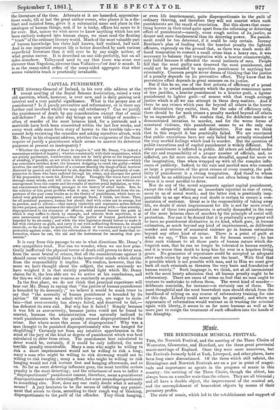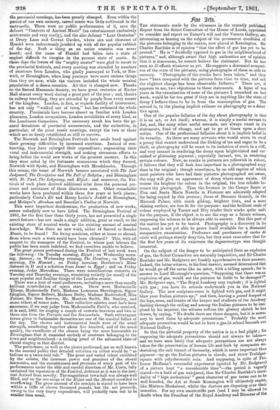311noir.
THE BIRMINGHAM MUSICAL FESTIVAL.
Tins, the Norwich Festival, and the meeting of the Three Choirs of Worcester, Gloucester, and Hereford, are the three great provincial music-meetings of England. Once they were more numerous, but the Festivals formerly held at York, Liverpool, and other places, have been long since discontinued. Of the three which still subsist, the Birmingham and Norwich Festivals are on a par in point of magni- tude and importance as agents in the progress of music in this country: the meeting of the Three Choirs, though the oldest, has always been on a smaller scale than the others. They are all triennial ; and all have a double object, the improvement of the musical art, and the accomplishment of benevolent objects by means of their Pecuniary profits. The state of music, which led to the establishment and support of the provincial meetings, las:been greatly ,changed. Even: within. the period of our own memory, sacred music was little cultivated in the metropolis. 'There were no public performances of it, save the defunct " Concerts of Ancient Music" ,(an entertainment exclusively aristocratic and very costly), and the .also defunct "Lent Oratorios" at Drury Lane and Covent Garden, ' where airs and choruses of Handel were inclecoscumly jumbled up with all the popular rubbish of the day. Such a thing as an entire oratorio was never heard; and the name of Handel had fallen into a state of neglect diifieult to imagine in the present state of music. In those days the lovers of the "mighty master" were glad to resort to the provincial festivals, and every meeting was attended by numbers of amateurs from London, who gladly journeyed to York, or Nor- wich, or Birmingham, when long journeys were more serious things than they are.now, while the -visitors included the whole musical population of a dozen .counties. All that is changed now. Thanks to the Sacred Harmonic Society, we have great oratorios at Exeter Ball almost every week during a great part of the year ; and, thanks to railway travelling, they,are attended by people from every corner of the kingdom. London, in fact, as regards facility of intercourse, has not only "walked out of town," but has embraced the whole country. Provincials have become almost as familiar with London pleasures, London occupations, London notabilities of every kind, as the Londoners themselves. The -necessary result •has been the ge- neral decadence of provincial amusements, and the extinction, in particular, of the great music •meetings, except the two or three .which are so -firmly established as still to survive.
The Norwich and Birmingham Festivals have made head against 'their growing difficulties by increased exertions. Instead of con- tracting, they have enlarged their expenditure; augmenting their vocal and instrumental strength, and making strenuous efforts to bring before the world new works of the greatest masters. In this they were aided by the 'fortunate •connexions which they formed, Norwich with Spohr, and Birmingham with Mendelesolin. Through this means, the name of Norwich became associated with The Last Judgment, The Orurifizion and The Pall of Babylon; and Birmingham with St. Paul, The Lobgesang, and Elijah : and moreover, the Fes- tivals of each place derived additional eclat from the personal pre- sence and assistance of those illustrious men. Other remarkable works have been produced within these few years at both places; particularly Caste's Eli and Henry Leslie's Judith at Birmingham, and Molique's Abraham and Benedict's Undine at Norwich.
This most important desideratum, the production of new works, seems unhafpily now to have failed. The Birmingham Festival of 1861, for the 'first time these thirty years, has not presented a single -novel feature—has not made a single .addition, great or small, to the existing store of musical works or the existing amount ,of musical knowledge. Was there no new work, either of Sacred or Secular Music, to be found ? No living musician, either at home or abroad, from whom such a work could have been obtained ? This, with all :respect to the managers of the Festival, to whose past labours the public has been much indebted, we find ourselves unable to believe.
The great pieces performed during the Festival of last week were the following : On Tuesday 'morning, Elijah ; on Wednesday morn- ing, Samson; on Wednesday evening, The Creation; on Thursday morning, The Messiah ; on Friday morning, Beethoven's Mina Brokmais in D and a selection from Israel in Egypt; and on Friday .evening, Judas Maccabeus. There were miscellaneous concerts on Tuesday and Thursday evenings, consisting entirely (as usual) of the :most.popular and familiarthings -of the London season. There was a host of vocal performers, including a more than usually brilliant constellation of opera stars. There were Madmoiselle Titiens, Madmoiselle Patti, Madame Lemmens Sherrington, Signor Ouglini, Signor Belletti, Madame Dolby, Madame Rudersdorff, Miss Palmer, Mr. Sims Reeves, Mr. Montem Smith, Mr. Bentley, and :some others of minor note. Their collective salaries must have been ,enormous, if. we may judge from Mademoiselle Patti's, who received, it imsaid, 5001. for singing a couple of oratorio bravuras and two or three airs from the Traviata and the Sonnambula. Such extravagant terms given to fashionable favourites are one of the musical follies of the day. The chorus and instrumental bands were of the usual strength, numbering together about five hundred, and of the usual quality, the excellence of the chorus being the more honourable to Birmingham that it consisted entirely of amateurs belonging to the town and neighbourhood—a striking proof of the advanced state of choral singing in that district. The performers, as well as the pieces performed, are so well known 'to the musical public -that detailed criticism on either would be " as tedious as a twice:told talm" 'The great and varied talent exhibited Ilty the satiates, the immense power and grandeur of the choral .harmonies, and the completeness and precision of every part of the performances under the able and careful direction of Mr. Costa, fully -sustained the reputation. of the Festival, deficient as it was in the inte- rest derived from novelty. The magnificent town-hall was always.well 'filled, and on the mornings of the Elijah and the Messiah crowded to overflowing. The gross amount of the receipts is stated to have been within a trifle of eleven thousand pounds, but the net proceeds, owing to the very heavy expenditure, will probably turn out to 'be tiroaller than usual.































 Previous page
Previous page